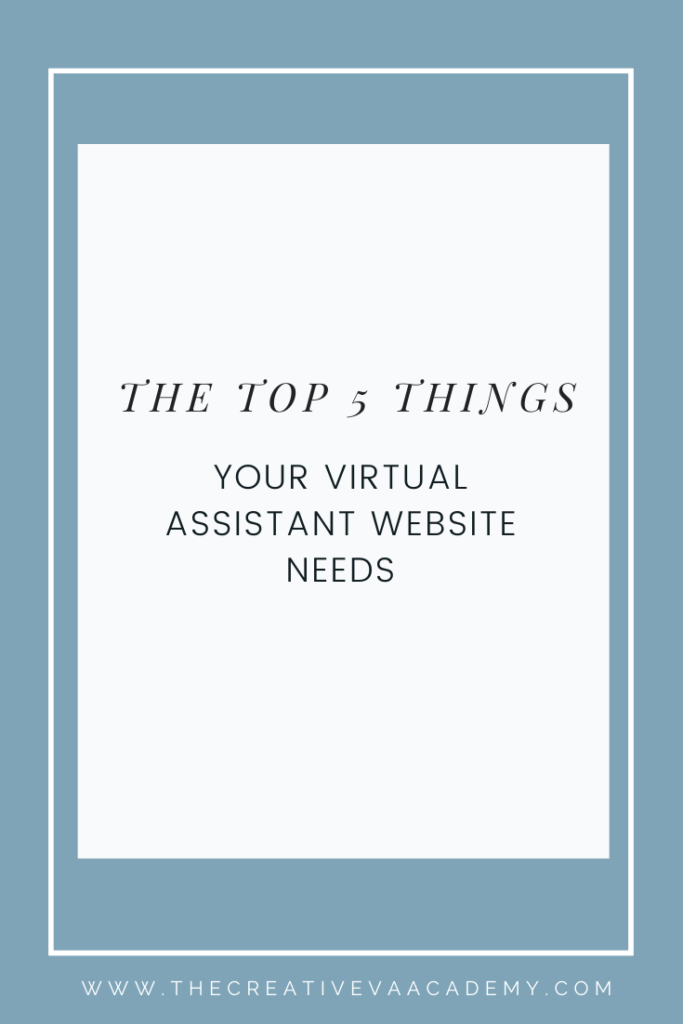As I have written before, you don’t need a website to get your Virtual Assistant gig off the ground! However, it is a huge part of gaining more clients and growing your business. While creating a virtual assistant website from scratch can be daunting (Trust me, I was so scared to make mine I waited 3 months before starting! I even made it on Squarespace, and started all over on Showit one week later!) So I have created a list of the MUST HAVES you need on your website, and why they are so important.
A few steps before we get started:
- Keep your virtual assistant website easy to read and easy to navigate. While it can be easy to add all of the things (and all of the services!) It is important to keep the website streamlined. I recommend the following pages to start: Home, About, Services, Contact and a Blog.
- Squarespace can be a lifesaver – While my virtual assistant website is not via Squarespace, I have built dozens of sites on Squarespace! It is hands down the easiest program to start with. It makes building a site quick and easy! Squarespace also allows you to easily update your website when you need to, without coding. If you are looking for a fully customizable website, I highly recommend Showit. My website is built via ShowIt, and it is hands down, the best platform I have ever used to create a beautiful website. You can customize each and everything, in an easy click and drag format.
I cover this topic (in much more detail) and SO MUCH MORE in The Creative VA Academy School! The Creative VA Academy School is for those who want to become virtual assistants, freelancers, and social media managers for creative businesses. This course teaches you how to work from home for creatives like wedding professionals, designers, and boutiques! In the Masterclass, I have a complete guide to what you need for your virtual assistant website, as well as SEO, blogging, and much more!
A contact form & email.
This is my BIGGEST pet peeve: If I can’t find your email address easily on your website, I will not work with you. Hands down. When I did wedding planning and was researching vendors, if their email address and contact form were not easily accessible, I did not even bother reaching out. So, my biggest advice: Have this easily accessible. I recommend having your email address in the footer of your website, so each and every page has it. I also recommend having a link to your contact form in the header of your website, on the far right. This way it is easy to find, and takes seconds for someone to contact you!
And while contact forms are great (and allow you to pre-screen future clients) it is important to still have the email address included. This way if the contact form does not work for any reason, they can still contact you. If you do not provide a second form of communication, the potential client might get frustrated, and move onto another website.
If you do a contact form, here are a few suggestions of what to have:
-Name & Email Address
-Company Name & Website
-Ideal start date
-What they are looking for in terms of services
-Additional comments
An informative about page.
People often hire not just because of the services the person offers, but because they can relate. Think of your favorite people you follow on Instagram: what is it you like so much about them? It most likely is because they are relatable! I advise having a small about you section on your homepage, as well as a separate page that shares more about you! Make sure to use high-quality photos, and don’t be afraid to post a picture of yourself! People want to know who they are working with. Not sure what to share? Here are some ideas:
-Your industry background.
-Your favorite things (coffee, colors, animals, etc.)
-Share about your family, and what makes you happy
-Tell a story about how you got started or a lesson you learned that changed your life.
Have a services page.
While this might seem obvious, I have seen countless Virtual Assistant and Social Media Manager sites that do not list their services! While you don’t need to list all of the services you offer, it is important to list the main ones. (I personally have more detailed information in the PDF’s I send potential clients.) I would also advise listing the platforms you work with, or have knowledge in. This way, a potential client can know off the bat if you know the service they need help with.
*In regards to pricing: I personally only share starting at pricing. This is because pricing can vary on the project, and can change. While you can share pricing if you wish, I recommend sharing a starting at number as a reference. This way you can weed out those who are out your price point, but also not give away too much!
A blog.
I wrote a previous blog post about why you need a blog, so I will keep it simple here. Blogging is one of the best ways to increase your SEO. Search engines like Google can “see” your website through your blogs! Search engines crawl your site, reading it to see what it is about. If you do not have fresh, relevant, and consistent content, then the search engine will not see it as a site worth showing. When you optimize your blog posts, you’re making your website more visible to people who are entering keywords associated with your product or service via search engines like Google. A blog also lets you share your knowledge, show off client projects, and show potential clients what you are an expert in.
BONUS: Not sure what to blog about? I have created a FREEBIE for that! My workbook for virtual assistants will walk you through everything you need to know about blogging! Plus, it will help you create 15 week of content, in under an hour!
Set up Google Analytics.
This is the best way to see what works on your website, and what doesn’t. It lets you monitor all visits, including when they visit, where they visit from, and what browser they use. It also lets you find out what the most popular pages on your website are, and what outside platforms drive the most to your website (for me, it is Pinterest!)
Getting started with Google Analytics is very easy, and free!
1. Set up an account by visiting google.com/analytics
2. Set up a property (aka your website)
3. Set up reporting on the property (aka reporting on your website)
4. Add the tracking code to your website. This should be in the Header of EVERY page. This way you can track which pages get the most traffic.
Once your analytics is set up, you can begin keeping track. I personally have a monthly spreadsheet where I track data like this, so I can better implement new strategies, as well as track what is performing the best.

*Some of the links in this post are affiliate links. This means if you click on the link and purchase the item, I will receive an affiliate commission at no extra cost to you. All opinions remain my own.
